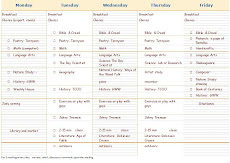Tuesday, March 17, 2009
Beginning Narration Notes
I haven't really tried to have Paddy narrate yet. When we pick up one of the stories from Ambleside that we haven't read for a while, I try to jostle his memory a bit... "remember how Paddle was in the beaver pond..." and then he fills in with whatever he wants to say. Then I keep reading. I am trying to focus on reading as a more contemplative thing with a beginning, middle and end, and try to let that develop into a narration and then discussion pattern naturally. I don't want to embarrass him as I am afraid I did when I experimented clumsily with narration when my older kids are younger.
So today, I said something like, "So what happened there?" I've done this a couple of times and he says something about the last thing that happened. In future I may slow down even more and ask him between short episodes or passages.
I've been narrating myself and it's not easy. There is something in my mind that balks at it, at being forced into the track of "what comes next". In "Blink" I read that there are two kinds of memory -- a huge visual-associative "right brained" bank and then the verbal/linguistic/sequential side. In the book, he says that the verbal memory can actually override the associative side and so some witnesses to crimes, for example, are LESS able to visually identify a suspect, say in a lineup, AFTER they have given a point by point description than BEFORE. Very interesting and may explain why the silent pond in my right brain resists being filtered through.
I find though that when I DO narrate or make that effort, it is easier to dredge the actual thing out of my mental pond later on. Charlotte Mason compares it to links in a chain. You make verbal associations with the visual, intuitional memories and that allows you to access them instead of having them lurk down underneath forever.
Some people have their beginners draw a picture about a story and then ask them to explain what is happening in the picture. Another method in Laura Berquist's book is for ME to draw the picture at his direction. That gives me an idea of what he sees.
Another thing I am considering, now that Aidan is in the habit of dictating journals for me to write down, is to ask Paddy to dictate journals and stories and then narrations. He would probably enjoy this since he sees me doing it with Aidan.
So today, I said something like, "So what happened there?" I've done this a couple of times and he says something about the last thing that happened. In future I may slow down even more and ask him between short episodes or passages.
I've been narrating myself and it's not easy. There is something in my mind that balks at it, at being forced into the track of "what comes next". In "Blink" I read that there are two kinds of memory -- a huge visual-associative "right brained" bank and then the verbal/linguistic/sequential side. In the book, he says that the verbal memory can actually override the associative side and so some witnesses to crimes, for example, are LESS able to visually identify a suspect, say in a lineup, AFTER they have given a point by point description than BEFORE. Very interesting and may explain why the silent pond in my right brain resists being filtered through.
I find though that when I DO narrate or make that effort, it is easier to dredge the actual thing out of my mental pond later on. Charlotte Mason compares it to links in a chain. You make verbal associations with the visual, intuitional memories and that allows you to access them instead of having them lurk down underneath forever.
Some people have their beginners draw a picture about a story and then ask them to explain what is happening in the picture. Another method in Laura Berquist's book is for ME to draw the picture at his direction. That gives me an idea of what he sees.
Another thing I am considering, now that Aidan is in the habit of dictating journals for me to write down, is to ask Paddy to dictate journals and stories and then narrations. He would probably enjoy this since he sees me doing it with Aidan.
Subscribe to:
Post Comments (Atom)



No comments:
Post a Comment